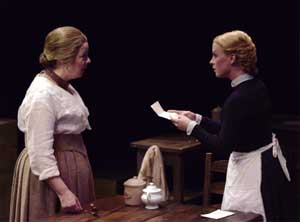Arts & Entertainment
Theater reviews
Published Thursday, 28-Apr-2005 in issue 905
Antigone
Deliver me from people who “know” they’re right.
The Greeks are back at 6th@Penn Theatre, in a splendid reading of Sophocles’ ancient but oh-so-timely Antigone, running through May 8.
In modern dress, before a very modern sign in Greek letters reading “Mission Accomplished,” a fine cast directed by Delicia Turner Sonnenberg plays out the tragedy pitting individual against state.
The issue is simple. All Antigone (Jennifer Eve Kraus) wants to do is give her brother a proper burial. The gods, after all, require it.
All her uncle, now King Creon (Dale Morris), wants is an orderly society, one in which the rule of law is paramount.
The brother in question, Polynices, took up arms against the city of Thebes and his own brother Eteocles. Defining this as treason, Creon orders a proper burial for Eteocles but decrees that Polynices be left unburied and un-mourned. How, after all, can you honor a traitor?
The hotheaded Antigone, described by Sonnenberg as the “first conscientious objector,” will have none of Creon’s decree. She announces that she will bury Polynices, come what may, and asks her sister Ismene to help. Ismene, the dutiful, compliant daughter, demurs, angering Antigone even more.
These two intractable forces – Antigone and Creon – go head-to-head in this timeless and timely story, which argues right vs. law, church vs. state. Creon is so hardheaded that even the fact that his son Haemon is engaged to Antigone doesn’t soften his heart; he sentences her to be entombed alive.
Dr. Marianne McDonald’s contemporary translation underlines the currency of the plot. Creon seems a very modern ruler indeed, obsessed with appearances and the letter of the law. Antigone is a typical protestor like many we see today – convinced of the rightness of her cause. But unlike many, she is also willing to die for it.
The genius of Sophocles is that he doesn’t take sides. Both are right; both are wrong. The tragedy is that neither is willing to compromise, fomenting needless death and misery.
Morris’ Creon is the perfect modern ruler, convinced that ruling well means keeping order at any cost, and hell-bent on ensuring that no woman be allowed to tell him what to do.
Kraus plays Antigone as a hothead with a heart: Sonnenberg even has her smooching with Haemon at the top of the play. This is not a professional political gadfly, but a sister who – whatever the cost – will not see her brother treated like a common criminal.
Laurence Brown is terrific as the Guard who brings the bad news to Creon that it was Antigone who buried Polynices. The Guard’s careful clarification that he’s only the messenger and not a supporter of the unlawful act can’t help but inspire a giggle of recognition from the audience.
Sylvia M’Lafi Thompson is wonderful as always, this time in the small role of the soothsayer Teiresias, who tries to warn Creon of the tragedy his action will bring about.
Antigone, one of the oldest plays, has much to teach us about politics and religion, conviction and compromise. See it, enjoy it, take it to heart.
Antigone plays through May 8 at 6th@Penn Theatre. Shows Thurs.-Sat. at 8:00 p.m.; Sun. at 2:00 p.m. For tickets call (619) 688-9210.
Vincent in Brixton
Everybody knows artists are a strange lot. Dutch artist Vincent van Gogh went crazy and cut off his own ear. But did you know he left school at 15, worked in his family’s business, flunked out of divinity school and lived and worked with the poor in England before deciding to paint?
The Old Globe Theatre presents Nicholas Wright’s Vincent in Brixton, chronicling the three-year period Van Gogh spent in England before he became an artist. The play runs through May 8 at the Cassius Carter Centre Stage.
Sent to gain experience in the London branch of the family’s business (dealing in art), Vincent (Graham Hamilton) arrives in Brixton at the age of 20 – a Dutch hayseed, naive, gawky and tactless of speech. He is also religious and a bit of a prig.
He knocks on the door of Mrs. Ursula Loyer in search of lodging. Mrs. Loyer (Robin Pearson Rose) agrees to take him in as a roomer, but warns that hers is a house full of free thinkers – not a churchgoer in the lot.
Vincent in Brixton is a fascinating pas de quatre featuring a peculiar assortment of characters: Mrs. Loyer, a widow of 15 years who still dresses in black and always looks sad; Ursula’s daughter Eugenie (Kate Steele), young, pretty, none too bright; lodger Sam Plowman (Ross Hellwig), a laborer of socialist leanings with aspirations of becoming an artist; and Vincent, probably the oddest of the group.
Wright’s script lets us in on Vincent’s timid steps toward liberation (his father might call it ruin) – he tries beer for the first time, makes a sad little pass at Eugenie (“Don’t talk to strange girls,” his father had counseled), then turns his attentions to the mother.
Psychologists could have a field day with this, and history does not clarify whether these events ever happened, but Wright’s script makes it seem possible. And likely or not, it’s captivating to watch, thanks to a terrific cast and fine direction by Richard Seer.
It is also a fascinating personality profile of this future artist, so full of contradictions and insecurities. This man who would paint in brilliant colors and become one of the world’s best-known artists (though not famous until well after his death) was not the least bit colorful in person: religious and a bit of a prig, in fact, and so shy that he once walked more than 40 miles to meet an artist, but couldn’t bring himself to knock on the door, and walked back without accomplishing his goal.
Hamilton is excellent as Vincent, though far too handsome to be confused with the artist in a lineup. But the personality characteristics are there – the hesitancy, the lack of tact, the difficulty carrying on a normal conversation. And he doesn’t drop the accent even once.
This is Vincent’s story, but Rose steals the show with her brilliant, poignant, completely believable portrayal of the achingly lonely Mrs. Loyer.
“No woman is old as long as she loves and is loved,” Vincent tells her, and it’s no surprise that she succumbs, though one may wonder how he suddenly acquires such articulateness.
Hellwig, from the Old Globe/USD actors’ training program, is convincing as Sam, the quintessential working man with higher aspirations. Steele is lovely and acts just like a young girl of the time should.
Caitlin Muelder does a nice turn as the bossy Anna van Gogh, who foments trouble when she comes to visit her brother.
Special kudos to lighting designer Chris Rynne, who has created some stunning visuals that qualify as art in themselves.
If great art comes out of pain and sorrow, it was inevitable that van Gogh would produce masterpieces. It’s a pity he didn’t live to see them appreciated.
It would likewise be sad if you missed this wonderful production.
Vincent in Brixton plays through May 8 at the Cassius Carter Centre Stage. Shows Thurs.-Sat. at 8:00 p.m.; Sun., Tues., Wed. at 7:00 p.m.; matinees Sat. and Sun. at 2:00 p.m. For tickets call (619) 23-GLOBE.
Late Nite Catechism
Listen up, class. Sister’s here with a rollicking, hilarious review of what you should have learned in catechism class all those years ago. Those abstruse notions like the Trinity and immaculate conception are tempered by easier-to-understand concepts like how St. Joseph can help you sell your house, how St. Patrick drove all the snakes out of Ireland (“They all ended up in Sacramento,” she notes), and why Sister thinks St. Simeon Stylites (the pole-sitting saint; yes, I know there were three but Sister didn’t mention that) should be de-sainted.
It’s Late Nite Catechism, back by popular demand for a limited run through June 28 at North Coast Repertory Theatre.
The fun isn’t limited to Catholics; everybody can play in this interactive romp by Maripat Donovan and Vicki Quade. And Sister (triple cast; I saw the terrific Kristen Moneagle) invites questions.
“Do you think priests should be allowed to marry?” asks one student.
“Only if they really, really love each other,” says Sister.
Get thee to this class, and be on time. That’s an order.
Late Nite Catechism plays through June 28 at North Coast Repertory Theatre. Shows Mon. and Tues. at 7:30 p.m. For tickets call (858) 481-1055.
A Skull in Connemara
The Spanish are known for their fascination with death, but they’ve got nothing on playwright Martin McDonagh’s Irish characters. As one critic noted, they are more than fascinated; they’re downright palsy-walsy with the Grim Reaper.
A Skull in Connemara, the second play in McDonagh’s Leenane trilogy (the first performed, and more famous installment is the astonishing The Beauty Queen of Leenane), plays through May 4 at 6th@Penn Theatre, directed by Forrest Aylsworth.
Skull features a quartet of poor and working-class characters: Mick Dowd (Charlie Riendeau), an occasional gravedigger, commissioned by the priest each year to dig up the bones of the dearly departed (seven years gone) so that the more recently deceased may be buried in those spots; the 70-year-old Maryjohnny Rafferty (Grace Delaney), who scams “eejit” Yanks out of a few coins, showing them the place where The Quiet Man was filmed (it was actually filmed 100 miles away), lives for bingo and visits Mick often in order to cadge drinks; Maryjohnny’s grandsons Mairtin Hanlon (Chris Bresky), an aimless young man; and his brother Tom (Christopher White), a cop.
McDonagh is known for dark humor; Skull is dark, all right: digging up the dead (and then smashing skulls and large bones); an endless discussion about whether it is better to drown in “wee” or in vomit; the local pastime of gleefully pushing your neighbor’s hot buttons while claiming to be kidding; the bloody and unexplained ending.
It’s the humor that’s largely missing here, and reason to care about these strange and oddly boring people.
A Skull in Connemara plays through May 4 at 6th@Penn Theatre. Shows Mon.-Wed. at 7:30 p.m.; Sun. at 7:00 p.m. For tickets call (619) 688-2910.
|
|
Copyright © 2003-2025 Uptown Publications





